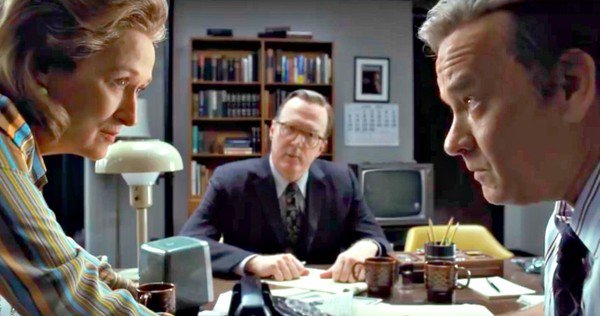The Post
Steven Spielberg (2017)
[av_image src=’http://jayruud.com/wp-content/uploads/2014/12/3-12.jpg’ attachment=313′ attachment_size=’square’ align=’left’ animation=’left-to-right’ link=” target=” styling=” caption=’yes’ font_size=” appearance=’on-hover’]
Three Tennysons/Half Shakespeare[/av_image]
[av_textblock size=” font_color=” color=”]
When first-time screenwriter Liz Hannah wrote the original screenplay for The Post in 2016, it was in response to her reading of Katherine “Kay” Graham’s memoir Personal History. Hannah, inspired by Graham’s impressive and eventful life and career, intended the film to be a biopic of Graham, turning on her first major decision as publisher of the Washington Post, the decision to publish the Pentagon Papers in 1971. In the fall of 2016, former Sony studio head Amy Pascal called Hannah to tell her she wanted to produce the film. At that time, the two women discussed the possible relevance of the story for contemporary audiences, and agreed that, with Hillary Clinton on the verge of becoming the first woman president, Graham’s story of a lone woman in a world of white men in suits, who essentially patted her on the head and ignored her, would resonate powerfully.
By the time Steven Spielberg signed on to direct the movie in February of 2017, the political landscape had changed drastically, and the theme of a news story being blocked by a bullying White House administration intent on limiting the first amendment rights to freedom of the press became far more topical. So topical, in fact, that Spielberg decided to put everything else on the back burner and begin shooting immediately in May, after convincing Meryl Streep and Tom Hanks to play Kay Graham and Post editor-in-chief Ben Bradlee respectively. Josh Singer (The West Wing, Spotlight) was brought in to do some revisions to the script. Thus what most people see as the film’s chief purpose—a veiled criticism of the Trump administration’s relationship with mainstream news media by portraying an historical instance of executive overreaching and attempting to suppress the news—was not in the original plan of the author or the producer—though by the time it got to Spielberg (and I assume Singer), it was impossible to ignore.
Still, the film makes no obvious or blatant references to contemporary events. Essentially the movie is one of Spielberg’s recent historical political thrillers, like his Bridge of Spies or even Munich, but it also very consciously belongs to the genre of films about investigative journalism that stretches from The Front Page and His Girl Friday through Call Northside 777 to Zodiac and The Paper, ultimately to Tom McCarthy’s 2015 Oscar winning Spotlight. While Spielberg’s film does not rise to the level of the undisputed classic of this genre, Alan J. Pakula’s All the President’s Men (1976), The Post is a noble and notable addition to this hallowed list. The scenes that focus on the old time linotype machines and hard-copy print runs, especially at a time when printed newspapers are losing readership daily, give the film a nostalgic feel, as if we’re back with Charles Foster Kane—whose line “I think it would be fun to run a newspaper” is echoed in Hanks’ line as Ben Bradlee, “My god, the fun!” as he glories in the midst of his working on the story of the Pentagon Papers.
If you are not quite as old as I am, and I’m afraid that’s true of the vast majority of our readers, then you may not remember the sensation caused by the Pentagon Papers: These amounted to some 7,000 pages of secret government documents that a former RAND Corporation employee and aide to Secretary of State Robert McNamara named Daniel Ellsberg copied and leaked to the New York Times in 1971. Ellsberg wanted to demonstrate to the country how the government, through the course of four presidential administrations, had been systematically lying to its citizens about the United States’ role in Vietnam. Particularly damaged by the release of these papers was McNamara, Defense Secretary under both Kennedy and Johnson, who documents showed knew as early as 1965 that the war was unwinnable, yet continued to send more and more soldiers to die by the thousands because, well, it would look bad to give up.
Spielberg’s film opens with Ellsberg (Matthew Rhys from TV’s The Americans) briefly in Vietnam, then working briefly for McNamara and becoming disillusioned when he sees the secretary announce to the press what he knows are complete falsehoods. We shift then to Bradlee in the Post newsroom, tired of being editor of “a nice local paper” and wanting to be more like the New York Times. In particular, he wants to know what the Times’ chief investigative reporter Neil Sheehan is up to, since he hasn’t had a story in some time.
Turns out what Sheehan is up to is composing a series of bombshell articles based on the Pentagon Papers, which the Times has receive from Ellsberg. In the meantime, Katherine Graham, who has inherited ownership of the Post from her husband, who had recently taken his own life, is about to take the paper public, with the advice—one might even say the bullying—of her board of directors, anchored most importantly by Fritz Beebe (Tracy Letts of The Big Short and Lady Bird) and Arthur Parsons (Bradley Whitford, playing the polar opposite of his character from The West Wing). It is important that nothing go wrong at this point, or the sale of the paper might be in jeopardy. A close friend of former Defense Secretary McNamara (Bruce Greenwood, who played McNamara’s boss JFK in Thirteen Days), Graham learns from him that the Times is about to run a story that will be extremely detrimental to him. She learns from Bradlee that this is precisely the story he would love to run.
The Nixon White House moves quickly to get an injunction to stop the Times from publishing any more stories, citing national security. But it appears that the Post may be able to pick up where the Times is forced to leave off. Post reporter Ben Bagdikian (Bob Odenkirk of TV’s Better Call Saul) happens to be an old colleague of Ellsberg and suspects he is the Times’ source. He is able to get hold of piles of documents, and brings them to Bradlee’s house, where a team of reporters works round the clock to try to put a story together. There are, of course, legal considerations in addition to financial ones that will affect the sale of the paper. If she agrees to publish, Graham may lose her corporation a fortune and end up landing both Bradlee and herself in prison. To publish or not to publish? The turning point of the film occurs when she must weigh the ethics of journalism against her family fortune, her lifelong friendships, her standing in society and her freedom, with Bradlee, Beebe, and Parsons on the phone trying to tell her what she should do.
Streep, of course, is phenomenal as always in portraying an insecure female who grows into her role as a woman making her way through an Old Boys world. She should receive her annual Oscar nomination for this film. Hanks is his usual charismatic self, imbuing Bradlee with a charm and wit he is not reputed to have possessed in real life. Greenwood manages to play the besieged McNamara with some sympathy, and Whitford and Letts are sufficiently condescending. But it’s Odenkirk who comes close to stealing the show. His performance as the veteran reporter who actually does the leg work and brings in the story not in any glorious way but through hard work and perseverance and a dedication to journalistic ethics is priceless.
The Post is certainly one of the most important films of the year. There have been some complaints that the film downplays the New York Times contribution, which was certainly more significant than the Post’s in bringing the Pentagon Papers to light. But this ignores the fact that the film was intended originally as a Graham biopic. Still, in the end I don’t think the film is on quite the same level as the genre’s standards Spotlight or All the President’s Men. In the first place, Spielberg can be heavy handed, as he occasionally is here: As Bradlee’s wife for example, a woefully underused Sarah Paulson, delivers a long, preachy monologue on how courageous Kay Graham is. If this were All the Presidents Men, the audience would be trusted to see that for themselves. In the second place, the film has something of a split personality. It is drawn in two directions, one toward a focus on Graham’s development from a cypher that the men in the room either ignore or walk all over to a woman who truly takes charge of a very difficult situation (which was Hannah’s original intent for the script), the other toward an historic parable of freedom of the press applicable to contemporary America (which is what Spielberg’s direction aims for). It’s not that the two can’t complement one another, but the emphasis of the film seems divided. Three Tennysons and half a Shakespeare for this one.
NOW AVAILABLE:
If you like these reviews, you might enjoy Jay Ruud’s most recent novel, now available from the publisher at https://encirclepub.com/product/the-bleak-and-empty-sea/. Also available from Amazon or Barnes and Noble.
When word comes to Camelot that Sir Tristram has died in Brittany of wounds suffered in a skirmish, and that his longtime mistress, La Belle Isolde, Queen of Cornwall, has subsequently died herself of a broken heart, Queen Guinevere and her trusted lady Rosemounde immediately suspect that there is more to the story of the lovers’ deaths than they are being told. It is up to Merlin and his faithful assistant, Gildas of Cornwall, to find the truth behind the myths and half-truths surrounding these untimely deaths. By the time they are finally able to uncover the truth, Gildas and Merlin have lost one companion and are in danger of losing their own lives.
https://drcarlosarzabe.com/dr-carlos-arzabe/ Order from Amazon here: https://www.amazon.com/Bleak-Empty-Sea-Tristram-Mystery/dp/1893035735/ref=sr_1_1?s=books&ie=UTF8&qid=1503328086&sr=1-1&keywords=Bleak+and+Empty+Sea
https://www.circologhislandi.net/en/conferenze/Tramadol Order Cod Order from Barnes and Noble here: https://www.barnesandnoble.com/w/the-bleak-and-empty-sea-jay-ruud/1126958139?ean=9781893035737


